
Falling for my bait - Deceiving the Deceivers: Unmasking Expert Fallacies and Court Report Lies of 2014
“…began when he stopped taking the psychiatric medication.”
— On 24 June 2014, Psychiatrist David Cassar and others, in their report submitted to the court, fell for my bait and wrongly concluded on this point.
“It doesn’t matter whether you took the pills or not; you’re still ill anyway. In the court reports, about seven psychiatrists examined you, and they all agreed on that point.”
— A few days after 9 October 2016, the same fraudulent and sadistic psychiatrist, David Cassar, replied to the letter I had sent him (dated 9 October 2016). In that letter, I revealed that I had lied to them back in 2014 — I had never actually taken any pills from the very beginning, and I had even kept them stored at home as proof.
Cassar’s hypocrisy — insisting on the lie just to save face while I was left disabled (headaches, insomnia, fever, erectile dysfunction) and slowly poisoned (Parkinsonism) by his toxic medication — gave me the strength to fight my case. I began by reporting him to the Ombudsman and the Medical Council, and when I saw that they were complicit with him, I decided to start this website on April 2018, after months of downloading ebooks and trying to learn the basics on the subject.
The following are the last three pages of the court report prepared by psychiatrists David Cassar, Peter Muscat, and Ethel Felice in 2014
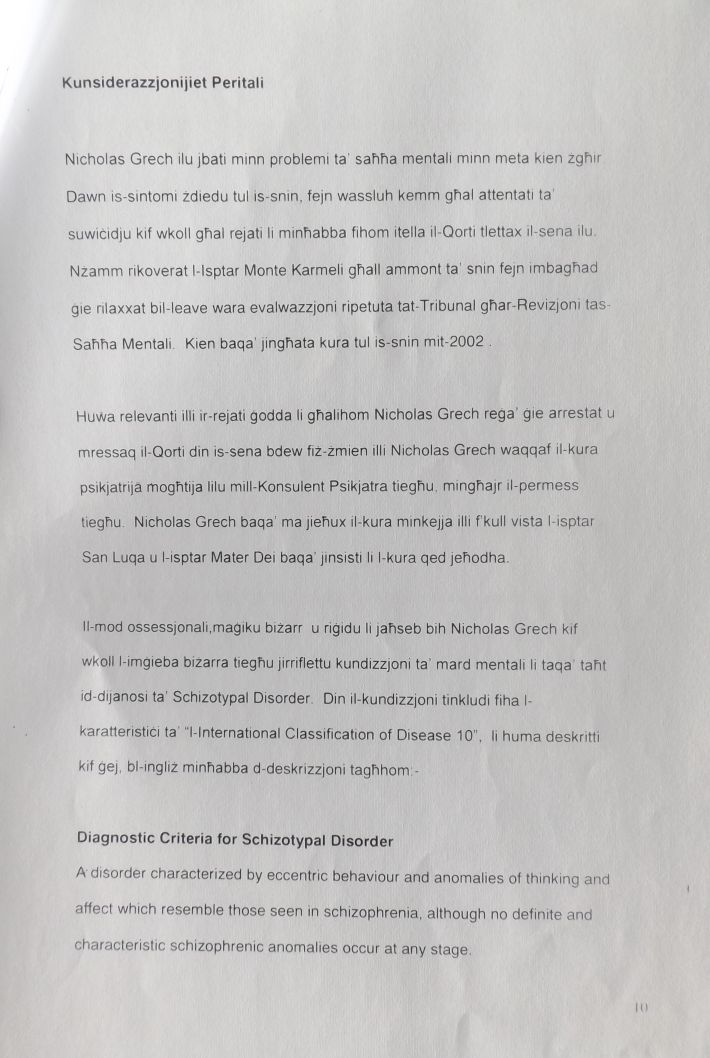
English translation:
Experts' considerations
Nicholas Grech has been suffering from mental health problems since childhood. These symptoms have worsened over the years, leading him to attempt suicide as well as commit crimes, for which he was brought to court 13 years ago. He was detained at Mount Carmel Hospital for several years before being released on leave after an evaluation by the Tribunal for the Revision of Mental Health. Since 2002, he has been undergoing treatment.
It is relevant to note that the new crimes for which Nicholas Grech was rearrested and arraigned in court this year began when he stopped taking the psychiatric medication prescribed by his consultant psychiatrist without permission. Despite this, during each visit to Saint Luke's and Mater Dei Hospitals, he continued to insist that he was following his treatment.
Nicholas Grech's obsessional, magical, bizarre, and rigid thinking, along with his unusual behavior, reflect a mental illness that falls under the diagnosis of Schizotypal Disorder. This condition includes characteristics outlined in the International Classification of Diseases (ICD-10), described as follows: (etc., the rest written in English).
Analysis
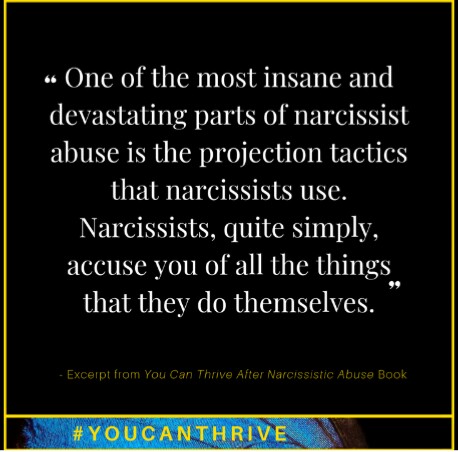
Let us analyze what "the supposed experts" have written, bit by bit.
The first paragraph begins by stating that I have had mental health problems since childhood (note that the word used is zghir, meaning "child", not zaghzugh, which means "young"). However, this blatant lie is contradicted within the same paragraph by the claim that I have “been under treatment since 2002.”
I was born in 1976, which means I was 26 years old in 2002. If I was a child in the late 1970s, I was certainly no longer one by 2002. By that time, I had already completed tertiary education, graduated four years earlier, and was working in a full-time position of responsibility.
If I had really suffered from mental health problems since childhood, this would have been documented in my school records. There would have been a psychiatrist treating me since I was a child, and I would have had a yellow card entitling me to free medication for mental illness. Yet, there is no such record—nothing at all—before 2002.
The year 2002 does not just expose this blatant lie about my supposed childhood mental illness; it also reveals another contradiction. Magistrate Carol Peralta appointed Psychiatrist David Cassar on my first court appearance on June 15, 2001, during my first case. Yet, months passed before Cassar saw me for the first time, on February 18, 2002, just two weeks after Peralta himself threatened to smash me against the wall during my fourth court sitting on February 4, 2002.
As if that were not enough, the same first paragraph contains another blatant lie: that I had “been detained at Mount Carmel Hospital for several years” prior to my second arrest in 2014. In reality, I was forcibly confined to the hospital for only 37 days in 2002 (from June 12 to July 19)—a move clearly intended to intimidate and discredit me (in their attempt to save Magistrate Peralta's career after his fiasco just 4 months before). Then, in 2005, after the appeal of my first case, I was detained for exactly two months (from 21-Nov-05, to 21-Jan-06). This totals just three months and one week — far from the claim of "several years." Furthermore, I only took sick leave for those 37 days in 2002 (despite not actually being sick), while for the two months in 2005–2006, I took unpaid leave to avoid risking my job. In total, I worked 15 and a half years before my second arrest in 2014.
The claim of "several suicide attempts" is equally absurd. If that were true, I must have more than one life, as I have never died, never been left disabled, and never even been hospitalized as a result of such attempts. This would be nothing short of a miracle — unless, of course, I had the Virgin Mary herself watching over me, while the undertaker cursed his luck! Once again, this proves the utter incompetence of these so-called psychiatrists and court experts, who failed to see the obvious: I was deceiving them, making a fool of them as if I were telling a story to a little child.
But what is truly astonishing is that, despite labeling me suicidal, Psychiatrist David Cassar prescribed me Fluanxol / Depixol — an injection that actually makes you suicidal! (See the linked table with dates showing when these venomous injections were administered.)
The second paragraph is even more interesting. If they are claiming that I repeatedly deceived my "Consultant Psychiatrist," Dr. Cassar, at every outpatient visit by making him falsely believe that I was taking my treatment, then they are implying that he was completely naive—or even incompetent—for believing me so many times.
After all, if I had lied to him repeatedly about taking my medication, why would he unquestioningly believe me when I later claimed to have "stopped the psychiatric medication"? Shouldn't he have at least suspected that I might be lying again? In reality, I had never taken any medication prescribed by him since 2002, from the very first time he saw me.
Would you believe someone who has lied to you 99 times on the same issue? And if you did—and ended up making a false conclusion in an official court report based on the 100th lie—you would risk becoming a laughingstock once the truth was exposed. This is especially true in the case of Dr. David Cassar, who maliciously discredited me and portrayed me as a lifelong mentally disabled individual.

Regarding the third paragraph, do you consider my research and the subdomain of this website, which I dedicated to the history of my hometown Mosta, to be part of what the most sadistic, fraudulent, and deceitful psychiatrist, David Cassar, distorted into my so-called "magical bizarre" way of thinking? What is truly “magical bizarre” in this perpetually corrupt country of Malta is that, despite exposing these lies, contradictions, and injustices with clear proof and multiple pieces of evidence, no one seems to care. People readily swallow lies without question, yet struggle to accept truth and evidence even when it is placed directly before their eyes and explained in detail.
Now, let's move on to the next page of the same court report.
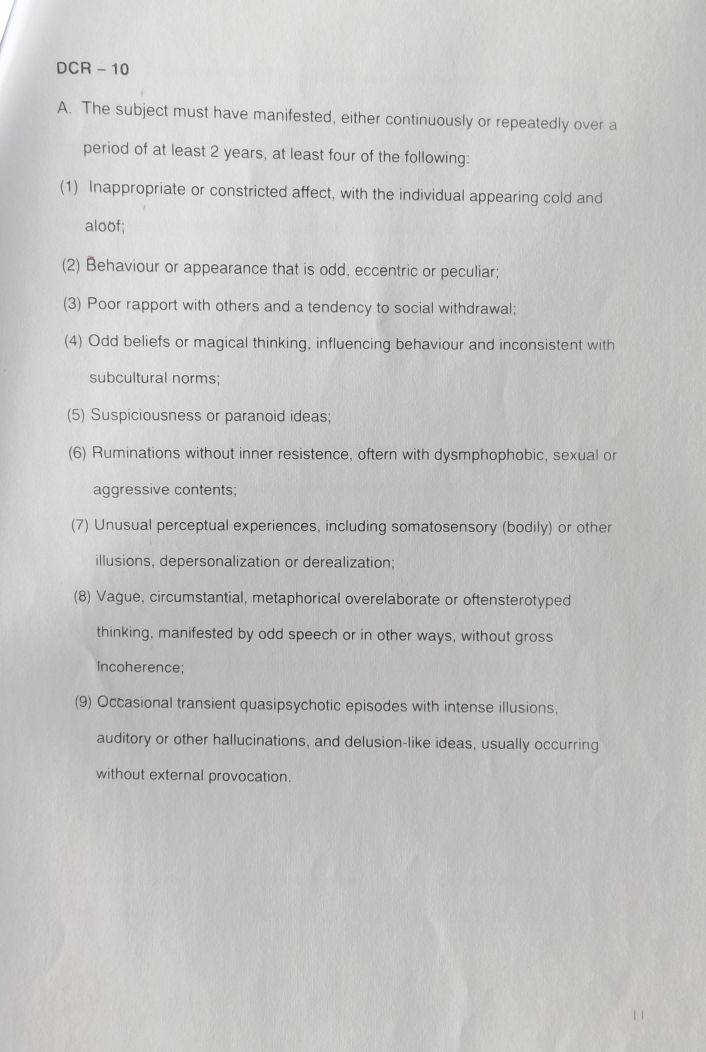
... and the next and final page of the report.
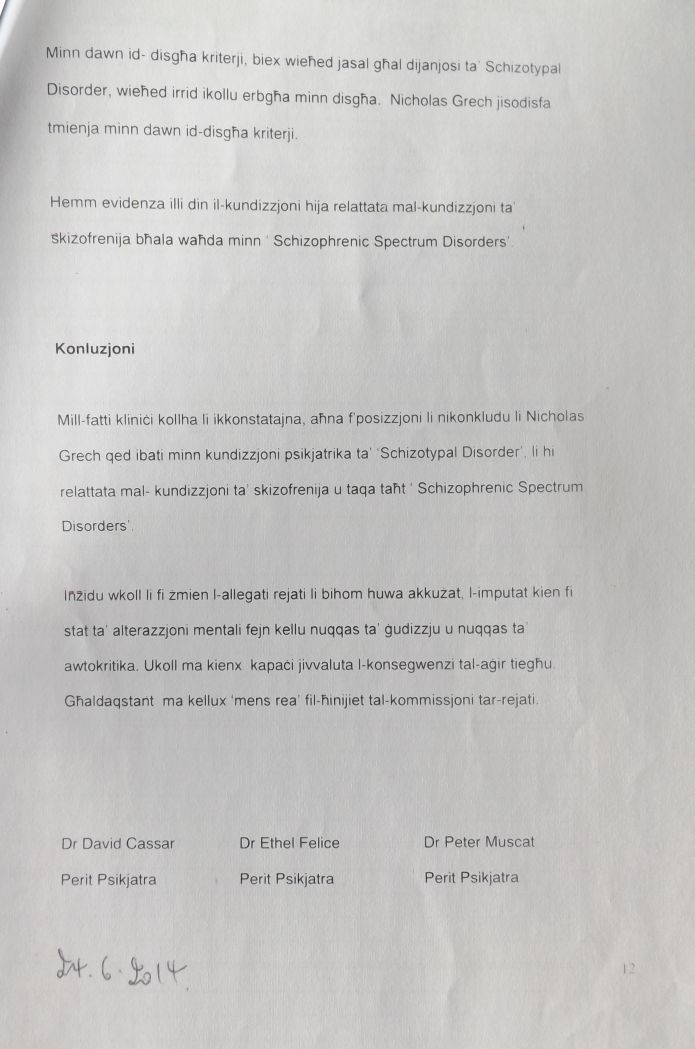
English translation:
From these 9 criteria, for one to arrive for diagnoses of Schizotypal Disorder, one has to satisfy 4 out of 9. Nicholas Grech satisfies 8 out of these 9 criteria.
There is evidence that this condition is related to the condition of Schizophrenia as one of Schihzophrenic Spectrum Disorders.
Conclusion
From all the clinical facts that we have evaluated, we are in a position to conclude that Nicholas Grech is suffering from a condition of ‘Schizotypal Disorder’ that is related to the condition of schizophrenia and fall under ‘Schizophrenic Spectrum Disorders.’
We also add that in the time of the alleged crimes of which he is accused, the defendant was in a state of mental alteration whereby he lacked judgement and autocriticism. Also he wasn't able to evaluate the consequences of his actions. As such he didn’t have ‘mens rea’ in the times of the commissions of the crimes.
David Cassar, Ethel Felice and Peter Muscat, the Expert Psychiatrists.
Analysis
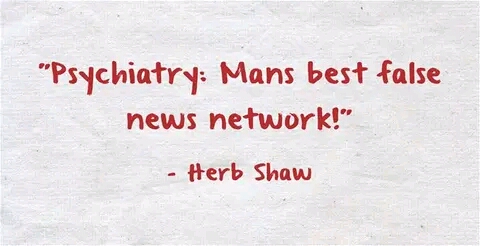
According to their own test, meeting just 4 out of the 9 criteria would be enough to label someone as schizophrenic. Yet they outrageously claimed I satisfied 8 — painting a picture of me as so mentally broken, so deeply and permanently ill, that I must have been like that since birth. According to them, I should have been unable to attend school, let alone learn to read or write. But the truth is the exact opposite: I completed tertiary education successfully, held a stable job for years without ever needing sick leave, submitted myself to no treatment whatsoever, and never had any issues at work, at home, or anywhere else. Their report isn’t just inaccurate — it’s a deliberate distortion. And the most telling part? They conveniently refused to specify which 8 criteria they claimed I met. Why? Because they knew they were lying. It would be almost laughable — if it weren’t so damaging — to hear these so-called experts try to point out the one miraculous criterion I somehow didn’t meet. Their silence on that one missing piece says everything. It doesn’t prove their diagnosis — it exposes them for exactly what they are: frauds hiding behind a false authority.
Regarding the conclusion: these blatant lies expose a fundamental truth — psychiatry and psychology rely on assumptions, not facts. It’s no surprise they so often reach false conclusions. Supposed experts, armed with years of experience, have instead turned psychiatry into a tool of deliberate deception: painting a distorted, false picture of reality and passing lies off as facts.
 Ask yourself this: would you tell the truth to someone who brazenly lies about you? Of course not. You’d mirror their tactics. Since my first encounter in 2002, they have consistently lied about me, dismissing genuine threats — like those from Magistrate Carol Peralta — as mere delusions. I kept the pills prescribed to me from the start, waiting for the right moment to expose their lies.
Ask yourself this: would you tell the truth to someone who brazenly lies about you? Of course not. You’d mirror their tactics. Since my first encounter in 2002, they have consistently lied about me, dismissing genuine threats — like those from Magistrate Carol Peralta — as mere delusions. I kept the pills prescribed to me from the start, waiting for the right moment to expose their lies.

When that time came, I gave them exactly what they wanted: bait to lead them to false conclusions in their court report, deliberately.
The video above, dated 7 January 2022 and taken from this TVMNews link, shows exactly the kind of fraudster and blatant liar you would expect from a psychiatrist — John Mifsud. He openly lies on our national Maltese TV station, portraying himself and his long-discredited profession of psychiatry as flawless, as if no one could ever deceive a psychiatrist. He was speaking in relation to the case concerning AA.
Just days later, on 12 January, psychiatrist Joseph Cassar certified AA as fit for interrogation. Yet by the following June, a report by three psychiatrists — George Debono, Jean Pierre Giorgio, and Anthony Dimech — concluded that AA had been insane at the time of the crime and was mentally unfit to stand trial at that stage.
Then, suddenly, three and a half years later, in January 2026, AA retracted his insanity plea, and psychiatrists Joe Cassar, Anton Grech, and George Debono re-examined him and declared him fit to stand trial.
Thus, Psychiatrist John Mifsud proves the opposite of what he claims — that psychiatrists and psychiatry have been massively inconsistent from the very beginning. If he, and psychiatrists in general, can make such claims so confidently and publicly on air, just imagine how they might behave behind closed doors with vulnerable patients — those who can be silenced simply by being labelled “mentally ill” with nothing more than a stroke of a pen.
The last page of another report, this one by criminologist/psychologist Roberta Holland
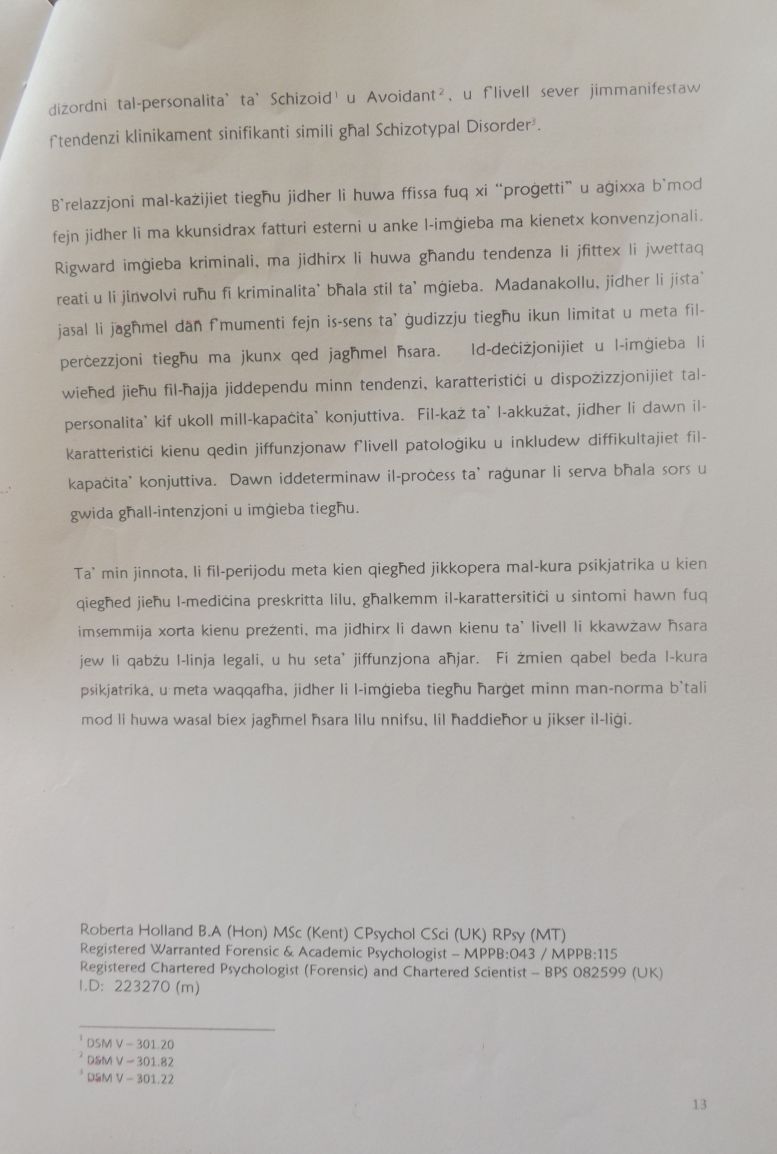
English translation:
… personality disorder with features of Schizoid and Avoidant types, which at a severe level manifests clinically significant tendencies similar to Schizotypal Disorder.
Regarding his cases, it appears he was fixated on certain “projects” and behaved in ways that suggest he did not consider extreme traits, and his behavior was unconventional. As for criminal behavior, there is no indication that he had a propensity to commit crimes or to engage in criminal activity as a consistent pattern. However, it seems he might resort to such behavior during periods when his judgment is impaired and he does not perceive his actions as wrong. The decisions and behaviors one exhibits in life depend on personality tendencies, characteristics, dispositions, and cognitive abilities. In the accused’s case, these traits seemed to function at a pathological level and included impairments in cognitive abilities. These factors influenced his reasoning process, which in turn guided his intentions and actions.
It is worth noting that during the period when he was compliant with psychiatric medication and taking the prescribed treatment, although the aforementioned traits and symptoms were still present, they did not appear to reach a level that caused significant harm or exceeded legal thresholds, allowing him to function better. Before starting medication and after discontinuing it, his behavior seemed to deviate from normal to the extent that he harmed himself and others and broke the law.
Analysis

It is worth noting the bombastic language used in the report, with phrases like “tendencies clinically significant similar to,” “conjunctive ability,” and “pathological level.” These terms often come across as unnecessarily complex—used by those who are presumptuous and eager to impress others with what they believe is their extraordinary intelligence, more for show than for clarity. Ironically, they seem unable to express themselves in plain, simple language that the average person can understand—not even the Magistrate, who likely has no background in such subjects. And the real paradox is this: the study of the mind is still so far behind other branches of medicine that even psychologists and psychiatrists themselves often fail to truly understand what they are describing.
According to this psychologist, I was allegedly suffering from “Schizoid and Avoidant Personality Disorder” and exhibited “extreme” and “unconventional” behavior. However, these claims were entirely inconsistent with my actual life at the time. I held a steady job, had a family, maintained friendships, and lived a healthy lifestyle—including exercising regularly, averaging two hours of physical activity per day, seven days a week.
These contradictions raise serious questions about the objectivity and accuracy of her assessment. By her own interpretative logic, one could just as easily label her as schizoid, given that she appears to project imagined symptoms onto others—such as diagnosing me with a mental disorder despite clear evidence to the contrary. Worse still, if she genuinely experiences such distortions herself, it may be that her own condition leads her to see others as ill in the same way — revealing not only personal bias, but a reliance on unfounded diagnoses and nonsensical assumptions rather than clinical facts.
She may pride herself on being a "Registered warranted forensic and academic Psychologist," a "Registered chartered Psychologist (Forensic) and Chartered Scientist," and proudly writes all those letters after her name (BA, MSc, etc.), presumably believing she also possesses a sixth sense — the ability to read minds — much like a fortune teller who claims to predict your future while unable to predict his own. But in the end, she must face the fact that she couldn’t even detect whether the person sitting in front of her — whom she was busy discrediting as some mentally disabled case — was actually taking her for a ride, lying to her, deceiving and misleading her, all while she remained completely unaware. In fact, it was this very deception that led her to write the completely erroneous final paragraph in the court report (and that’s without even getting into the rest of it). That paragraph included glaring factual inaccuracies—most notably, attributing my behavior to the cessation of a treatment I supposedly received during the three years before my arrest (as I led her to believe). The truth is, I never actually took the treatment she referred to—not even during the previous nine years, from the very beginning. And even if I had, it was so insignificant that it couldn’t possibly have had any meaningful effect. These kinds of fundamental errors reveal not only a troubling lack of fact-checking, but a deeper issue: in psychiatry, facts are too often ignored in favor of presumptions, personal bias, and outright fabrications.
At the end of the day, she is like that Stulta Stultorum—a fool of the fools—the village idiot with the intelligence of a parrot, not only swallowing and repeating lies without suspicion, but proudly writing them down in her conclusion as evidence of her lack of expertise, her phoniness, and the fraudulent nature of psychiatry itself. Just like the fortune teller who pretends to read your future while completely blind to his own, she too lives in delusion, cloaked in titles but void of insight.
Consider, for example, the ancient Greek philosopher Pythagoras. Imagine if, instead of formulating the famous theorem (a2 + b2 = c2), he had written an elaborate report only to conclude something absurd (a + a = a2). He would not be remembered as a mathematical genius, but rather as a fool, a cautionary tale illustrating what another Greek philosopher once admitted humbly about himself: “I know that I know nothing.” Or more plainly, “The only true wisdom is in knowing you know nothing.”
But in the case of someone presumptuous, the opposite applies: they know nothing yet present themselves as a know-it-all. It’s one of the strange ironies of the world we live in—that a person born poor and uneducated might end up a master craftsman, celebrated for their brilliance, while another, wealthy enough to study at prestigious universities abroad, ends up more foolish than when they started — armed with a diploma, but none the wiser.
This brings to mind Charles Darwin’s theory of evolution, where only the strongest and most adaptable survived over millennia. Yet in the span of a mere century, modern science and medicine have enabled the weak and ignorant not only to survive but to thrive — and worse, to dominate. Their half-baked ideas and baseless assumptions are imposed on others, becoming the new norm. They take medication for the slightest discomfort and expect the rest of the world to do the same. In their ignorance, they cannot even recognize how little they understand.
To grasp the absurdity and injustice of it all, imagine being falsely diagnosed with AIDS — without any blood or urine tests — suddenly labeled a drug addict, a frequenter of prostitutes, or some kind of sexual deviant. That would be devastating enough. But to be falsely branded as mentally ill is even worse. You lose all dignity. You become a voice crying in the wilderness, ignored and dismissed. Your protests mean nothing, your words taken with a pinch of salt. And no matter how hard you try, you can’t scrub off the mud they’ve so maliciously smeared over you.

Roberta Holland, the criminal psychologist, was supposedly helping the police build a profile of me — the so-called 'Mosta Cat Killer.' At the time, there were still six months to go before I’d finally be caught and arraigned in March 2014, yet people were already convinced that some dangerous psychopath was behind those ‘awful crimes’ and ‘gruesome killings.’
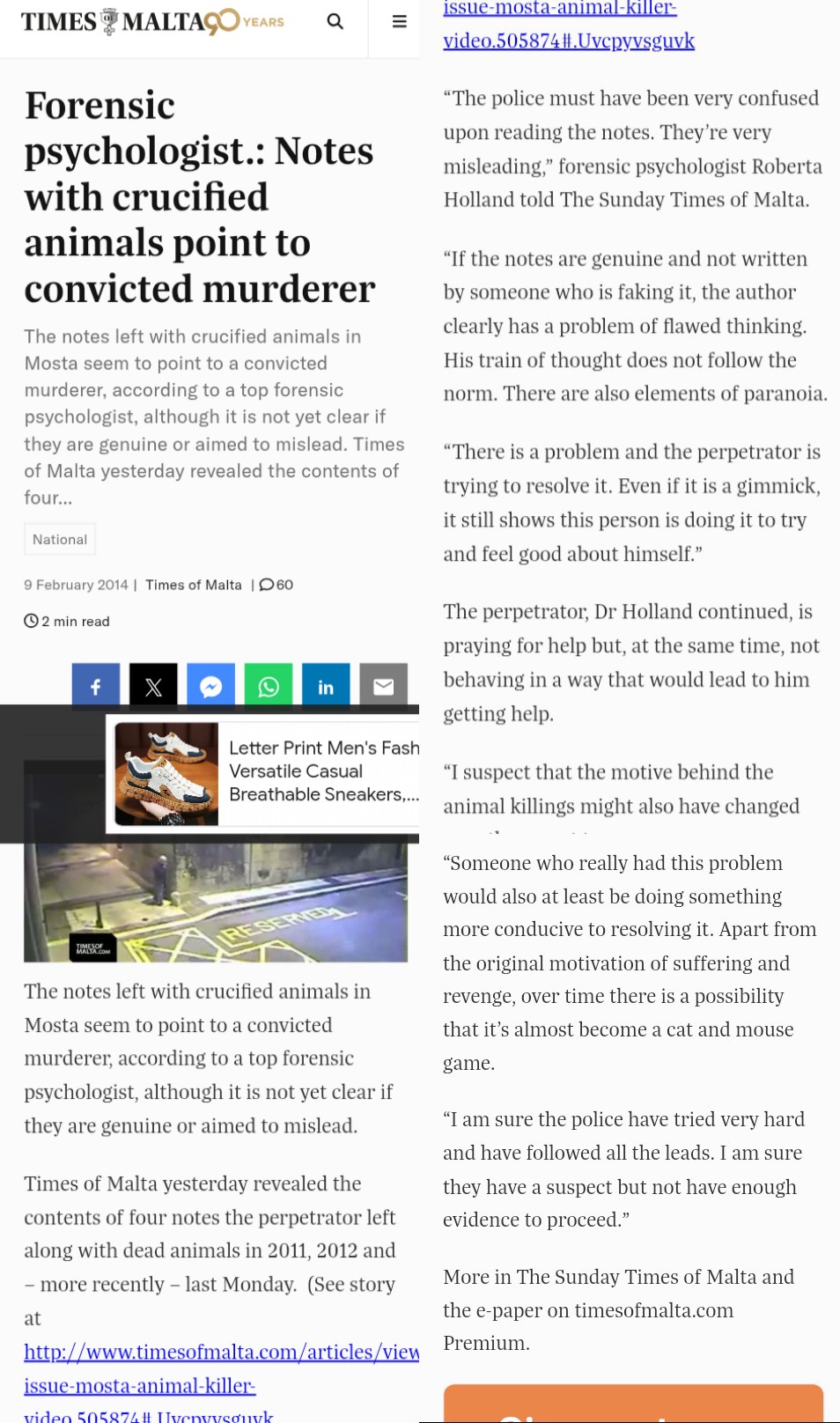
In truth, I was quite the opposite — full of humor, and for over two years I had been staging what were simply harmless pranks, always on specific dates (mostly the 16th) and in carefully chosen locations in my hometown. Honestly, I couldn’t have made it easier for them to catch me — yet they never did. That’s not cleverness on my part; that’s just plain incompetence on theirs. I sometimes even left cryptic notes meant to mislead investigators, especially the type like Roberta. To this day, I still can’t tell who misled the police more — me, or Roberta, with her stupidity, her nonsense theories, and her complete lack of insight.
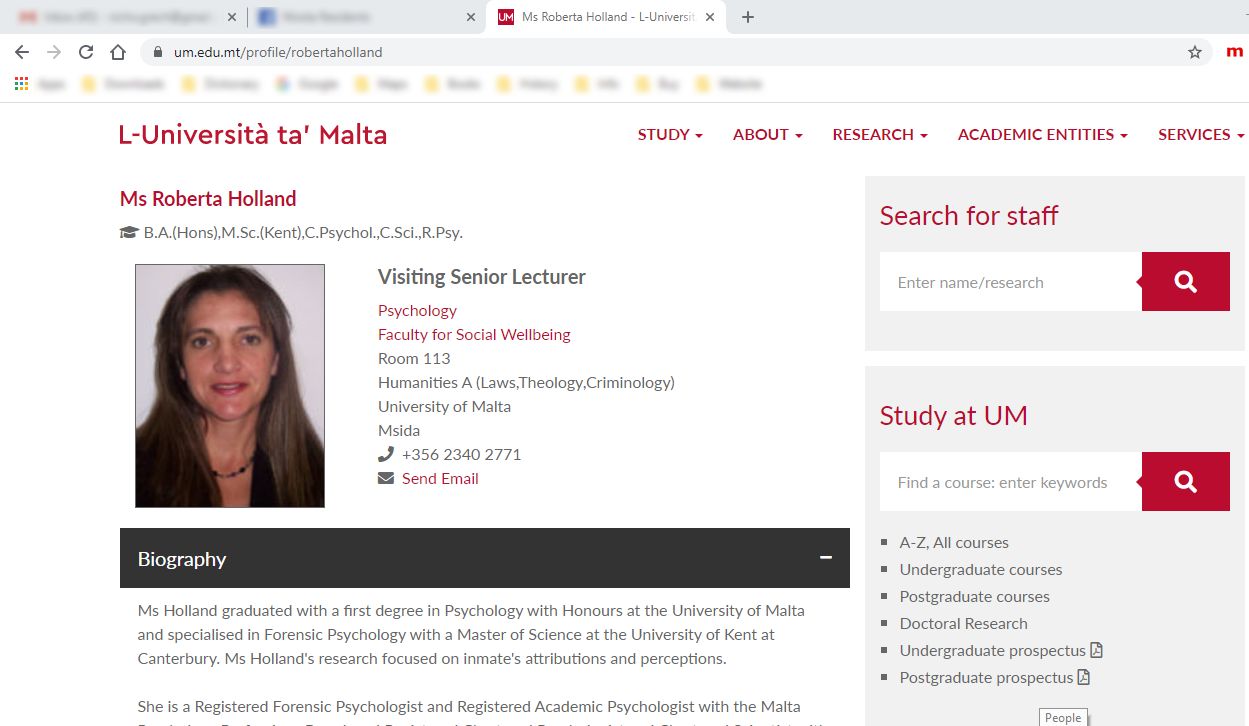
The above is a screenshot of Roberta's Holland profile, extracted from the University of Malta website. It presents her role as a visiting lecturer, showcasing her supposed academic and intellectual capabilities. What troubles me is how individuals like Holland — often presented as experts — can project authority while reaching conclusions that, in my case, were fundamentally flawed and deeply damaging.
In Maltese, we sometimes use the term "basset" to describe someone whose ideas may sound assertive or confident, but are ultimately empty — making a lot of noise without substance. It’s a fitting metaphor for what happens when qualifications like “Graduated with Honours in Psychology” are used to validate what I believe are careless assumptions and intellectually shallow reasoning.
More ironically, her profile also highlights a background in Theology — a field rooted in reflection, moral responsibility, and compassion. And yet, in my case, she demonstrated none of these values. If she truly internalized what she studied, she might have approached her assessment with greater humility, caution, and self-awareness.
To borrow from the very teachings she claims to know: “Why do you see the speck in your brother’s eye, but fail to see the plank in your own?” (Matthew 7:3). The fact that someone who prides herself on studying Theology could act with such blindness to her own intellectual and ethical shortcomings is, to me, evidence that she has understood neither Psychology nor Theology in any meaningful way.
The damage caused by her report was not theoretical — it affected my life in very real, serious ways. And that is what makes this kind of professional overconfidence not just frustrating, but dangerous.
After all this, don't expect Magistrate Carol Peralta to be any different ...
Extract from the court sentence, page 3
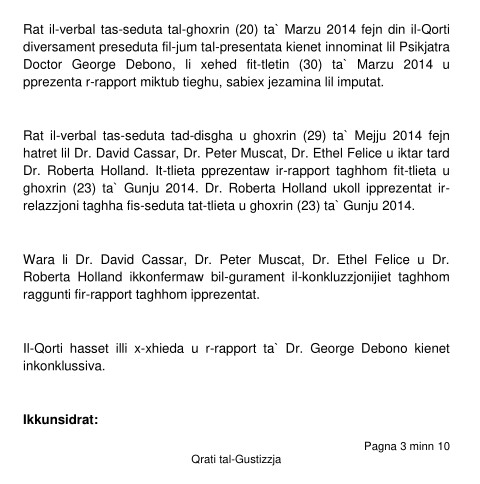
English translation
- Having seen the transcript of the court sitting of the twentieth (20th) of March 2014, during which this Court, presided over by a different magistrate (Magistrate Dr. Marsanne Farrugia), began hearing the case ("presentata" likely refers to "as presented"), and appointed Psychiatrist Dr. George Debono to examine the accused. Dr. Debono testified on the thirtieth (30th) of March 2014 and submitted his written report.
- Having seen the transcript of the court sitting of the twenty-ninth (29th) of May 2014, during which the Court appointed Dr. David Cassar, Dr. Peter Muscat, Dr. Ethel Felice, and later, Dr. Roberta Holland. The first three submitted their report on the twenty-third (23rd) of June 2014. Dr. Roberta Holland also submitted her report during the court sitting held on the same day.
- After Dr. David Cassar, Dr. Peter Muscat, Dr. Ethel Felice, and Dr. Roberta Holland confirmed under oath the conclusions reached in their respective reports.
- The Court found that the testimony and report of Dr. George Debono were inconclusive.
Extract from the court sentence, page 5

English translation
- This Court is not obliged to rely on the experts' opinions if it disagrees with their conclusions.
- However, in this case, the Court finds that it cannot disagree, because the experts' judgment was based on a psychiatric evaluation, and the outcome of that evaluation is rooted in scientific findings. Therefore, the Court believes it cannot disregard their conclusions regarding the chronic illness from which the accused suffers.
- As a result, the Court is faced with a situation in which it is convinced that the unlawful act was indeed committed by the accused, but that it occurred while he was suffering from a psychotic episode — a severe mental illness that deprived him of the ability to distinguish between right and wrong.
Analysis
Note how Peralta quotes the date"thirty (30) March 2014" using BOTH words and figures, as if to emphasize the accuracy of this date. This is when the supposed psychiatrist, George Debono, testified and submitted his court report. However, that date happened to fall on a Sunday. He should have written 30 April 2014 — a month later. It was not some genuine mistake by Peralta. Given the revenge he sought against me, he deliberately manipulated the date to make it seem as though the report was filed BEFORE he officially took over my case on 1 April 2014 — April Fool’s Day — coinciding with my second court appearance in my second case that year.
It was as if he wanted to start everything afresh. My first court case had clearly left a strong impression on him; it wasn’t just another file he forgot after it was closed. On the contrary, he remembered me vividly — as well as the psychiatrists he had previously appointed. These same psychiatrists had essentially saved his career during a crucial moment, and now he was rewarding them again with another assignment. He knew exactly the kind of "expertise" to expect from them.
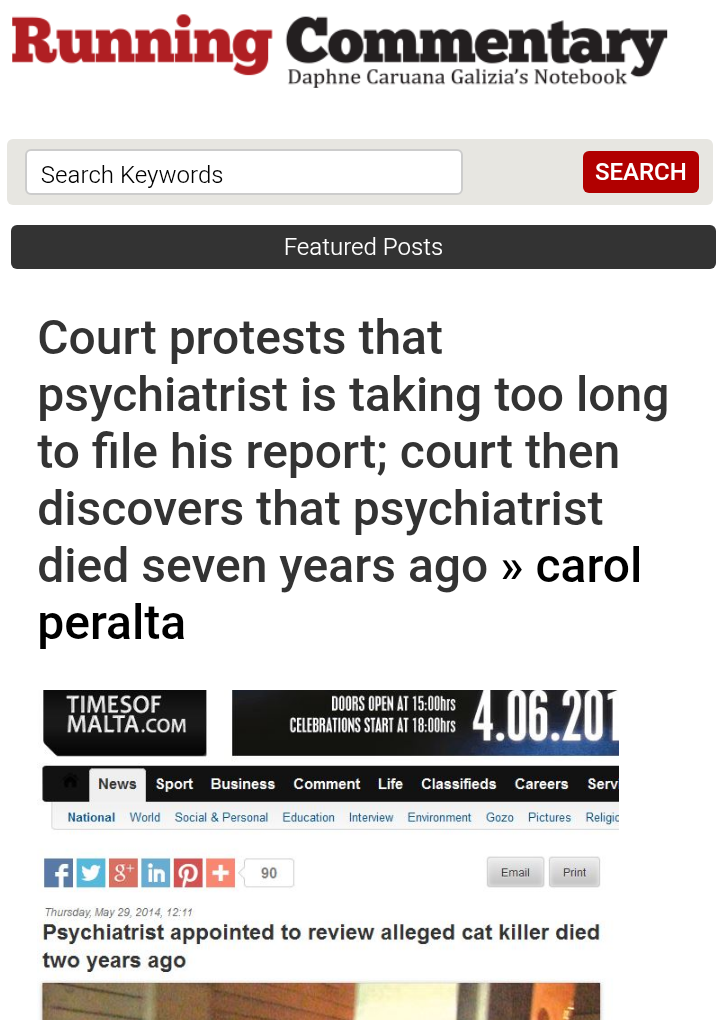
By pretending to seek independent evaluations, he simply re-used the same people who had already declared me mentally ill. He knew there was virtually no chance they would now contradict their earlier judgment — especially if the process was biased from the start. The only hiccup in his plan was that one of the three psychiatrists from the first case, Joseph Pisani, had since passed away. So, on 29 May 2014, he replaced him with Ethel Felice, a woman intended to "balance" the panel. But the reality was that the two dominant male psychiatrists — both from my first court case — would ultimately dictate everything.
It would have been futile for me to attempt explaining the complexities of my first case in front of them — even with Ethel Felice present. She was unlikely to override, or even question, their original account. Ultimately, my only way out was to accept being labeled mentally ill once again — but on my own terms: by deliberately leading them to that conclusion through a web of fabrications they would foolishly believe and rely on. In doing so, I would expose the flaws in their reasoning and demonstrate that these psychiatrists — and, by extension, the field as a whole — are not merely unreliable but complete frauds: people utterly incapable of deciphering a mind, let alone detecting a lie crafted specifically to mislead them.
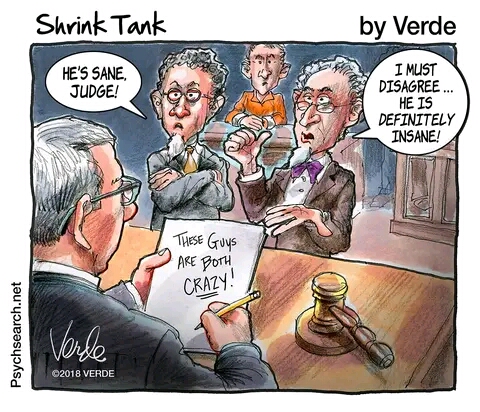
The sentence “The Court felt that the testimony and the report of Dr. George Debono was inconclusive” is particularly revealing. Peralta's use of “The Court” and the previously mentioned intentionally incorrect date may be a deliberate attempt to suggest that this occurred during Dr. Marsanne Farrugia’s tenure — before Peralta himself took over. It is as if he is implying that she was the one who found Debono’s testimony inconclusive and that the process had to start from scratch, redoing everything afresh.
In doing so, Peralta decisively discredits Debono’s professional standing, portraying him as incompetent, lacking expertise, unfit for purpose — essentially, a waste of time when it comes to delivering psychiatric opinions. The Maltese word “iċċumbah” — meaning “he hit the nail on the head” — captures this bluntly: not only was Debono wrong, but psychiatry itself is portrayed as flawed, even fundamentally illegitimate and fraudulent. For rest assured: had there existed some X-ray test or whatever equivalent, Debono would have used it to avoid the embarrassment of being portrayed as a pure Gahan — a colloquial Maltese term for a fool.
Peralta unintentionally exposes psychiatry as a discipline in which the psychiatrist is, in essence, a failed doctor — a fraud on a scale far greater than any fortune-teller. This reflects a broader, deeply rooted skepticism toward psychiatry — one that Peralta clearly recognized and shared — grounded in the belief that psychiatric assessments lack objective scientific evidence, such as blood tests or brain scans, and are therefore inherently unreliable.
But later, Peralta outright contradicts himself by calling the report written by the three others and Roberta Holland "a scientific one." Scientific? It was so full of so-called “science” that they all walked straight into my trap and drew the exact conclusion I wanted — the wrong one. These people pretend they can read minds, yet they’re so pathetically incompetent they can’t even tell when someone is blatantly lying to their faces.
I told Debono the same thing I told them — just weeks apart. So if Debono alone is, in Peralta’s eyes, a fool for producing an "inconclusive" report, then what does that make the others? Even bigger fools. All of them — the three plus Holland — managed to humiliate themselves by calling their nonsense a "scientific" and conclusive report, when in reality, it was built entirely on lies they were too arrogant and clueless to recognize.
If Debono’s report proves anything, it’s not about me — it proves he’s a fraud. And if the others came to the same bogus conclusion, then they’re even worse. (I don’t have Debono’s report in hand, but I’m pretty sure I fed him the same lie — only he was too unsure to commit, so he landed on "inconclusive.")
There is no science in psychiatry. None. Psychiatrists can’t even agree on the same person, the same case. One sees it round, another square. One claims certainty, another hesitates. One delivers a wrong conclusion with confidence, another delivers an inconclusive — and still wrong — mess. They're not experts. They're charlatans, pretending to decode minds when they can’t even spot a lie served to them on a silver platter.
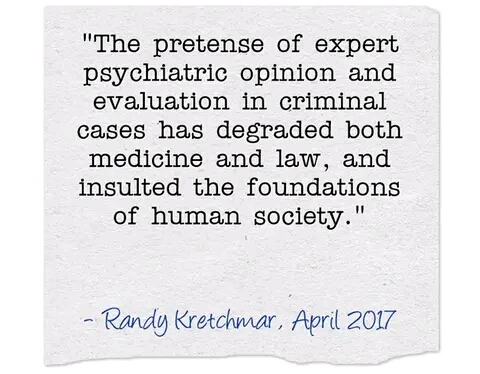
Now let us analyze in more detail some key dates, all from the year 2014:
- From 20 March (when psychiatrist Debono was nominated) to 30 April (when he testified and submitted his report), there are 41 days.
- From 7 May (when three psychiatrists were nominated, but Pisani had already died) to 29 May (when Holland and Felice, instead of Pisani, were nominated), there are 22 days.
- From that same 29 May (when the three psychiatrists, including Felice, were officially nominated) to 24 June (when they testified and submitted their reports, along with the one by Holland), there are 26 days.
- But incredibly, from the court sitting on Tuesday, 24 June (when these two reports were submitted), to Thursday, 26 June (when the sentence was delivered), only two days passed. How could Peralta possibly find a gap in his busy court schedule to set a court sitting within just three days — during the same week, not even across a weekend? Did he somehow have ample spare time to write a 10-page sentence (admittedly, most of it was copy-pasted)?
Was Peralta trying to convey some message to me by intentionally delivering the sentence on 26 June?

Of course, this was all premeditated. When I searched "26 June" out of curiosity, the first result was a Wikipedia article noting that it's the 177th day of the year. That number, 177, also happens to be the identity card number of the daughter of that former registrar — whom I had mocked for so long during my first court case, and whose number I often wrote on walls with reference to her, among other things.
This date, therefore, was no coincidence. I’m certain Peralta deliberately chose it to send a message: that this was a continuation of my first court case. A form of revenge he had long been planning. Everything felt so carefully orchestrated. So much I was denied a fair trial and suffered yet another miscarriage of justice.
The date of the sentencing — 26 June 2014 — was therefore not random at all. Not a day earlier or later. It was specifically chosen to trigger painful memories and remind me of the injustice I had previously endured. The second court case felt like a direct continuation of the first, bringing more humiliation and unfairness. Hopefully, one day, such calculated cruelty — this act of metaphorically rubbing salt into the wound — will serve to further incriminate those involved.
Peralta’s full sentencing document can be found at this link.

Also, as shown in this Wikipedia link, "The United Nations International Day in Support of Victims of Torture is an international observance held annually on 26 June to speak out against the crime of torture and to honour and support victims and survivors throughout the world". Magistrate Carol Peralta undoubtedly knew this. In fact, the article even mentions: "On 16 July 2009, the International Day in Support of Victims of Torture was chosen as a public holiday in Bosnia and Herzegovina" — where he himself had been stationed.
After spending nearly six years in exile in Bosnia and Kosovo — torn away from his home, his friends, his colleagues, and his beloved Malta — because I had reported him, he must have come to see himself as a victim. Perhaps even one of those very victims of "torture" that the UN day was meant to honour. When the UN mission in Kosovo ended in September 2012, it gave him the perfect opportunity to return (in March of that year) and slide back into his old role — as if nothing had happened.
To those who think his time in the Balkans was some kind of career promotion, let’s be honest: it was more like a teacher being forced to leave his post, spending years abroad pretending to be a university professor, only to come back in shame to the same school he was ousted from. And it was even more humiliating than that — because when he came back, he publicly admitted that he didn’t even know if he’d be allowed to return to the bench because of the fiasco in my case and because I had reported him.
But somehow, he did return. And then, on 26 June 2014 — of all days — he sentenced me. So once again, that date wasn’t chosen at random. It was deliberate. Calculated. The symbolism must have thrilled him. The United Nations Day in Support of Victims of Torture… and there he was, using it to turn the tables — to punish the one who had exposed him. It was revenge, plain and simple.
He must have also felt a personal connection to that date — 26 June — which had been officially declared a public holiday in Bosnia and Herzegovina on 16 July 2009. Perhaps, in his mind, this was no coincidence. As I had often played the pranks on the 16th of various months, he maybe saw himself as guided — even divinely authorized — to seize this symbolic opportunity to exact the ultimate revenge.
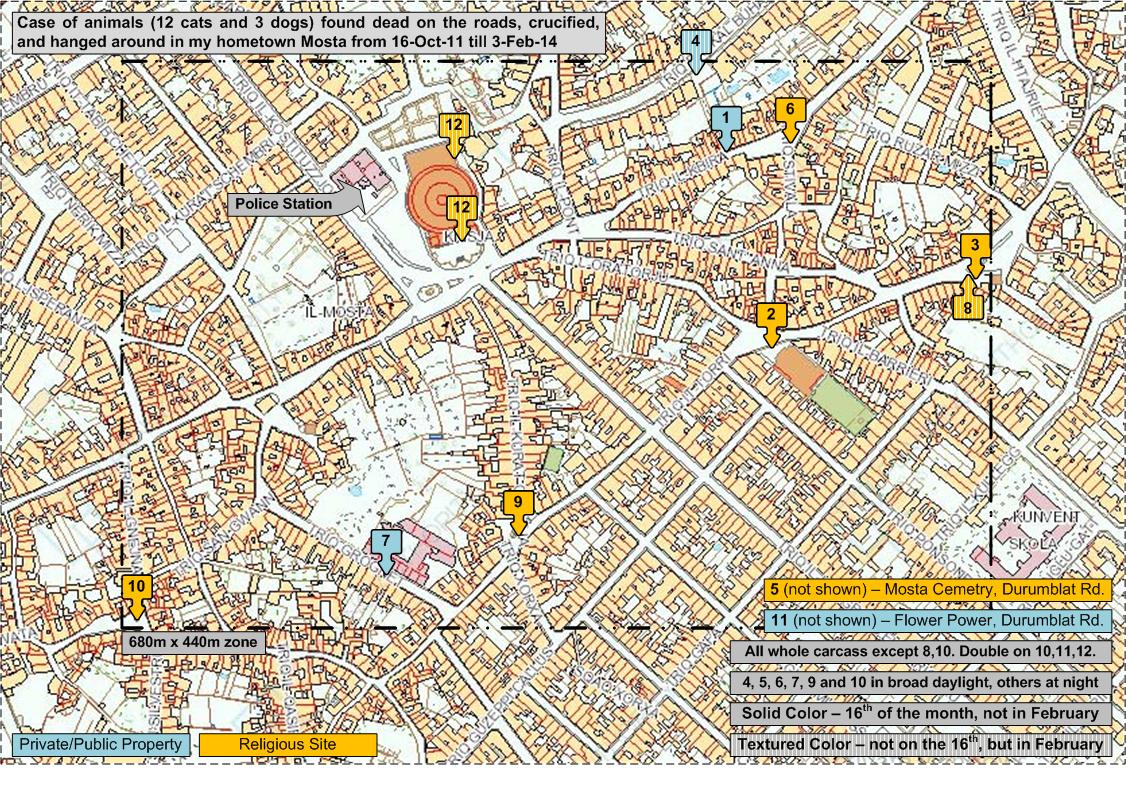
Also, given that I had so often chosen the 16th of various months — for doing my pranks with crucified animals — it’s as if he sought to respond in kind, selecting a date deeply meaningful to him. Perhaps he imagined me as someone fixated on dates and patterns, someone who would eventually decode his vindictive message — that there was significance in the date of 26 June, which he so deliberately chose for my sentencing. As though he wanted me to grasp just how far his narcissism extended: a carefully staged act of revenge, orchestrated with symbolic precision. As if to say, “wahdu jieħodha r-risposta — he will get the message on his own.”

And he knew exactly what kind of “torture” lay ahead for me. He knew that psychiatrist David Cassar had already prepared a fate far worse than anything he had experienced himself: a slow, silent, medical execution through the cruel side effects of psychiatric drugs. What he endured abroad was exile. What I was about to endure was destruction.
But if you seriously think I’m just making things up or blowing them out of proportion, think again. From April 1st — yes, April Fool’s Day, when Magistrate Carol Peralta conveniently took over my case from Magistrate Marsanne Farrugia — to June 26th, when Peralta threw me into Mount Carmel Hospital, only 86 days passed. Just 86 days. That’s how fast he moved to get rid of me. If every magistrate or judge in Malta worked that fast, the massive backlog in our corrupt courts would be wiped out in no time. Cases would be wrapped up in a matter of months — no matter how complicated. But no, that kind of “efficiency” is only reserved for people like me — targets.
Peralta acted so quickly to deliver my sentence — essentially handing me over on a silver platter to Psychiatrist David Cassar, giving him the green light to unleash his venom of psychiatric medication, full permission to drug me into silence. This conveniently satisfied Peralta’s appetite for revenge by disabling, sedating, and erasing me — slowly eliminating me through chemical means, all while keeping everything looking neat and legal. The premeditated plan to destroy me, masterminded by these two through their abuse of power, was flawlessly executed under the guise of legality.
This wasn’t justice. It was a cold, calculated hit job — a perfect collaboration between two men drunk on power and revenge. They exploited the timing and capitalized on a moment when character assassination and media-fueled hatred — amplified by baseless police accusations — had reached their peak.
This wasn’t just abuse of power. It was premeditated destruction, carried out under the polished mask of justice.
Also between 12 June 2002— the first time Peralta had me locked up and forcibly kidnapped to Mount Carmel Hospital during my first court case, only to later go into self-imposed exile abroad after I reported him —and 26 June 2014, when he finally got the chance to sentence me to that same hospital in my second court case, exactly 4,398 days passed. That number — 666×6 + 66×6 + 6—carries a chilling symbolism. In Christianity, 666 is called the "number of the beast" (Book of Revelation 13:18). Who knows? Maybe Peralta, in his cruelty, deliberately shaped it that way — like some twisted message or signature of the torment he inflicted.

I won't go into too much detail here, but consider this: Peralta associated himself with the Freemasons — not a noble or transparent organization like the Sovereign Military Order of Malta, but a group known for secrecy, for power plays behind closed doors. That says enough about his character. And yet again, we find him acting on a 26th — his (forced) resignation letter is dated 26 August 2015. The same day of the month. Exactly 14 months after locking me up. Exactly 60 weeks and 6 days later. Or 426 days, which just happens to reduce to 66×6 + 6×6 − 6 = 666 − 6×6×6 − 6×6 + 6 + 6. Coincidence? Or part of a pattern?
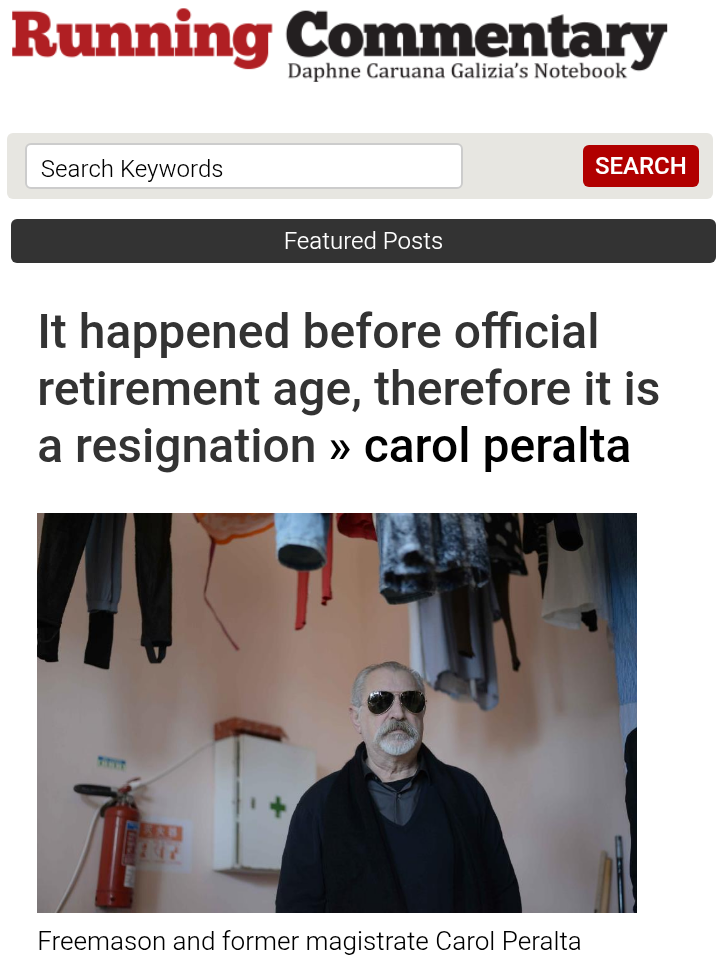
I don’t believe this was random. Just as Judas was destined to betray Christ, I believe Peralta was meant to show the world — through his brutality and control — how deeply corrupted the Maltese justice system has become. His sadism isn’t just personal. It’s symbolic. It exposes something far bigger, something rotting at the core of the system. These emails I've written (a, b) are just glimpses — windows into what’s hidden beneath the surface.
As for me, I’ve come to feel that I’m living a faint echo of Christ’s own suffering — betrayal, humiliation, being falsely accused and silenced. Psychiatry, as I’ve come to know it, isn’t about healing. It’s about control, punishment, and erasing the voices that are too inconvenient or too honest. My pain, my misfortune, my inherited struggle — it feels like it’s woven into my very blood, passed down from my father, and from his father before him.
There are so many dates that line up in strange, disturbing ways — birthdays, death anniversaries, ID numbers, family events, even the lives of my pets. It’s as if everything was set in motion long before I was even born. As if we are all just acting out something written ages ago.
If I survive this — if I somehow escape the poison of Psychiatry, and leave Mount Carmel Hospital alive and with my mind intact — maybe I will write a book. And in it, I will dedicate a chapter to this haunting numerology. To the way time and fate and suffering seem to fold in on themselves. One quote from the Roman poet Marcus Manilius comes to mind:
"Nascentes morimur, finisque ab origine pendet."
"As we are born, we die; and the end is tied to the beginning."
Maybe that’s the cruelest part of it all — that we were never really free, our destiny is written at birth.
Daphne saw it for what it really was: a gross miscarriage of justice and a dangerous abuse of psychiatric authority
In corrupt Malta — a country where power and impunity often walk hand in hand — it took just one journalist to notice that something was profoundly wrong in my case. One journalist, the only truly investigative voice with the courage to speak truth to power, saw what no one else dared to confront.
That journalist was Daphne Caruana Galizia.
Daphne exposed corruption and abuse at the highest levels of government. Her assassination by car bomb in 2017 sent shockwaves across Europe. Her death confirmed what many already suspected: in Malta, telling the truth comes at a price.
Locally, she was derided as a mere “biċċa blogger.” Internationally, she was honoured after her death as a fearless journalist. But long before the accolades, Daphne had the clarity and integrity to see through the injustice in my case — and she called it out.
She was one of the very few who recognised the abuse of power by Magistrate Carol Peralta, who ordered that I be committed to a psychiatric hospital — not for a crime, but based on a manipulated narrative and a convenient label of schizophrenia.
On the surface, my case may have seemed unusual — even sensational. But Daphne saw it for what it really was: a gross miscarriage of justice and a dangerous abuse of psychiatric authority. She understood the implications immediately, and she wrote:
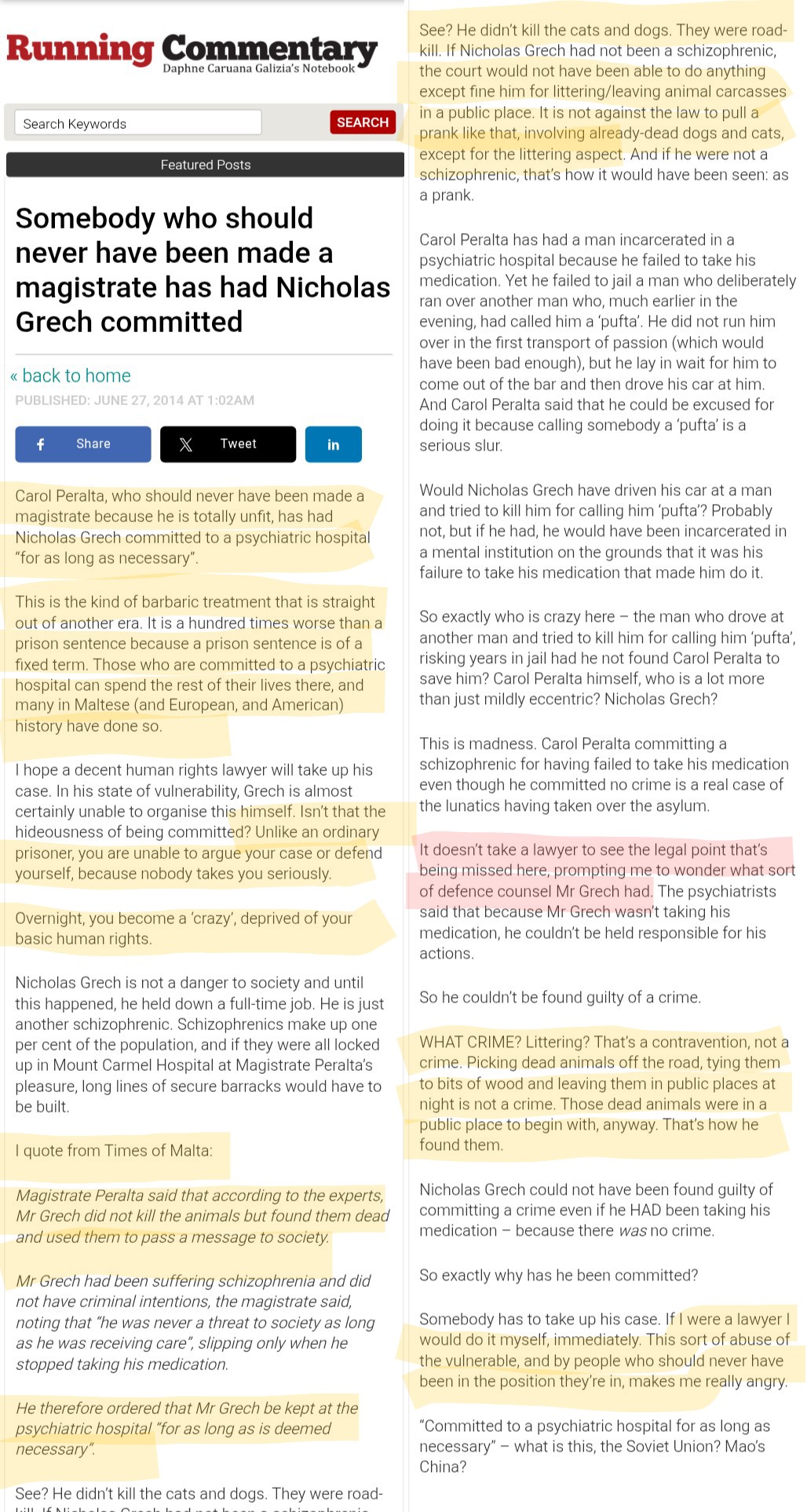
Carol Peralta, who should never have been made a magistrate because he is totally unfit, has had Nicholas Grech committed to a psychiatric hospital “for as long as necessary”.
This is the kind of barbaric treatment that is straight out of another era. It is a hundred times worse than a prison sentence because a prison sentence is of a fixed term. Those who are committed to a psychiatric hospital can spend the rest of their lives there, and many in Maltese (and European, and American) history have done so.
I hope a decent human rights lawyer will take up his case. In his state of vulnerability, Grech is almost certainly unable to organise this himself. Isn’t that the hideousness of being committed? Unlike an ordinary prisoner, you are unable to argue your case or defend yourself, because nobody takes you seriously. ...
Overnight, you become a ‘crazy’, deprived of your basic human rights.
Nicholas Grech is not a danger to society and until this happened, he held down a full-time job.
I quote from Times of Malta:
' Magistrate Peralta said that according to the experts, Mr Grech did not kill the animals but found them dead and used them to pass a message to society.
Mr Grech had been suffering schizophrenia and did not have criminal intentions, the magistrate said, noting that “he was never a threat to society as long as he was receiving care”, slipping only when he stopped taking his medication.
He therefore ordered that Mr Grech be kept at the psychiatric hospital “for as long as is deemed necessary”. '
See? He didn’t kill the cats and dogs. They were road-kill. If Nicholas Grech had not been a schizophrenic, the court would not have been able to do anything except fine him for littering/leaving animal carcasses in a public place. It is not against the law to pull a prank like that, involving already-dead dogs and cats, except for the littering aspect. And if he were not a schizophrenic, that’s how it would have been seen: as a prank.
Carol Peralta has had a man incarcerated in a psychiatric hospital because he failed to take his medication. Yet he failed to jail a man who deliberately ran over another man who, much earlier in the evening, had called him a ‘pufta’. ...
This is madness. Carol Peralta committing a schizophrenic for having failed to take his medication even though he committed no crime is a real case of the lunatics having taken over the asylum. ...
It doesn’t take a lawyer to see the legal point that’s being missed here, prompting me to wonder what sort of defence counsel Mr Grech had. ...
WHAT CRIME? Littering? That’s a contravention, not a crime. Picking dead animals off the road, tying them to bits of wood and leaving them in public places at night is not a crime. Those dead animals were in a public place to begin with, anyway. That’s how he found them. ... Nicholas Grech could not have been found guilty of committing a crime even if he HAD been taking his medication – because there was no crime.
Now imagine if Daphne had known the full extent of the machinations behind that court case:
- That the psychiatric label itself was fabricated — and that the original diagnosis had no legitimate basis.
- That the so-called experts fell for deliberate bait, believing I had stopped taking medication, when in truth, I had never taken any at all — well before I began what she rightly described as a “prank” involving already-dead animals.
- That the court proceedings were riddled with legal contradictions, procedural violations, and personal threats — including Magistrate Peralta threatening to smash me against a wall.
- That the entire case was part of a systemic effort to silence dissent, dressed up as psychiatric care.
What would Daphne have written then?
She wouldn’t have let it go. She would have kept digging. She would have peeled back every layer of deception, exposed every hidden hand, and laid the truth bare for all to see. With her fearless pen and unwavering commitment, she would have turned my case into a national scandal — a symbol of institutional abuse and judicial failure..
It would not have remained a footnote. It would have become a cause..
That is what Malta lost when Daphne was murdered..
Her words gave me a flicker of hope in a time of darkness. And though she is no longer with us, her legacy endures — continuing to speak out against injustice, against corruption, and in defence of those who are silenced.
Citing the cold, calculated deception of narcissist Magistrate Carol Peralta — who had the audacity to claim, “the result of their examination was a scientific one” — the following scientific claim may prove useful … :
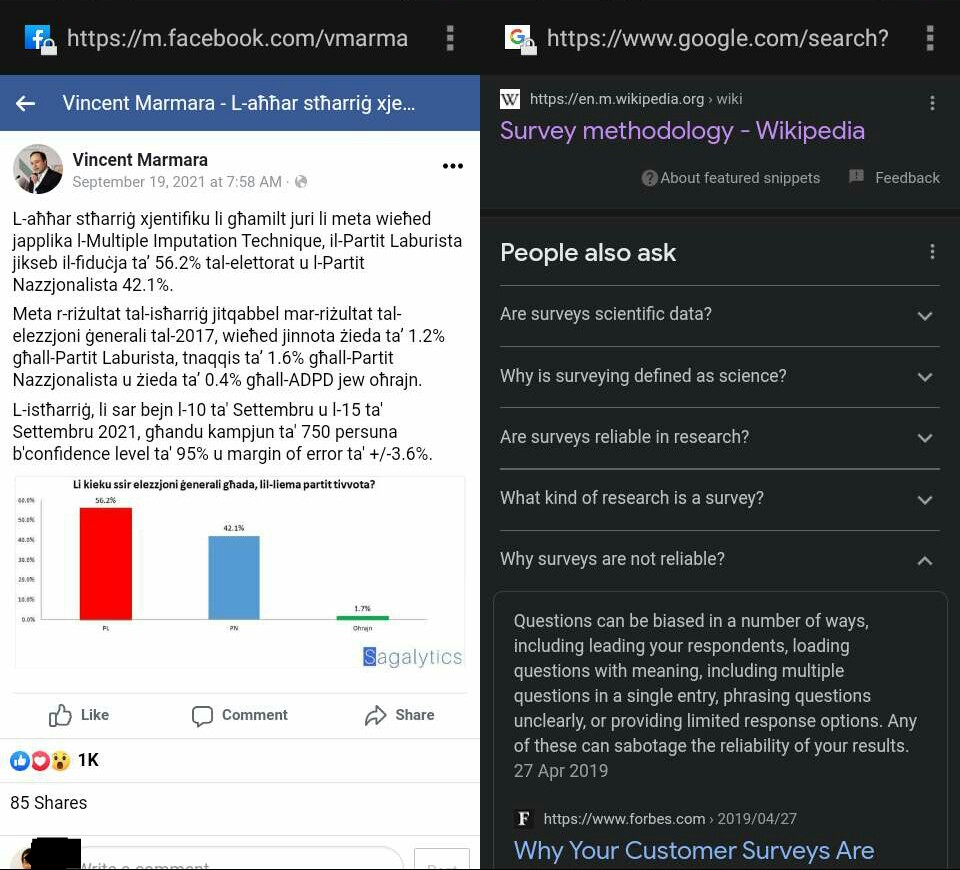
To illustrate the problematic nature of such claims, consider Vince Marmarà’s so-called "scientific" surveys. For instance, he states:
“The latest scientific survey I conducted shows that when one applies the Multiple Imputation Technique... The survey was carried out over six days, with a sample size of 750 people, and has a margin of error of ±3.6%.”
We seem to be living in an era where the mere application of the label "scientific" is used to lend undue credibility to research or findings, regardless of the rigour or context involved. In this instance, the survey is designated "scientific" " on the basis that 750 individuals were asked about their voting intentions.
To put this into perspective, imagine a shopkeeper — say, the owner of a supermarket — who knows from experience that every six days, he sells 750 cabbages, broken down into 56.2% of type PL and 42.1% of type PN. Based on this pattern, he adjusts his stock levels accordingly throughout the year ±3.6%.
By the same logic, should we then classify this stocking strategy as a "scientific" operation? And should the supermarket be permitted to advertise that it manages its inventory through "scientific methods" ?
Such comparisons underscore the importance of exercising caution when invoking the term "scientific," especially when it is used to validate conclusions that may not rest on rigorous or impartial analysis.
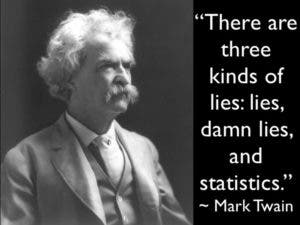
"The Diagnostic and Statistical Manual of Mental Disorders (DSM) is a reference book on mental health and brain-related conditions and disorders. (In the excerpt above from psychologist Roberta Holland’s report, she refers to the DSM three times — see the endnotes at the bottom) . The American Psychiatric Association (APA) is responsible for writing, editing, reviewing, and publishing this manual."
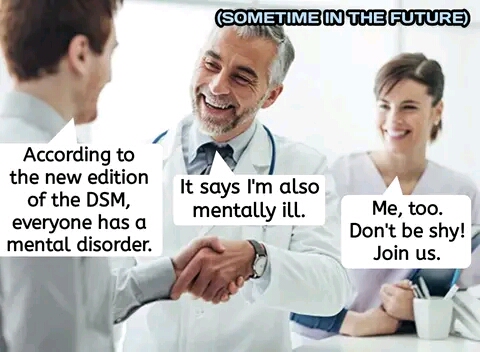
Despite living in an era of continuous scientific breakthroughs, psychiatry still lacks even the most basic scientific tests on which to base its diagnoses. Psychiatrists end up grasping at straws, adding a "statistical" layer in a desperate attempt to appear credible. But even in statistics, there's no real science behind their claims. In the end, psychiatry continues to confirm itself as a completely unscientific profession. Psychiatric diagnoses still rely entirely on fallible, subjective judgments — leaving their victims to suffer the consequences.
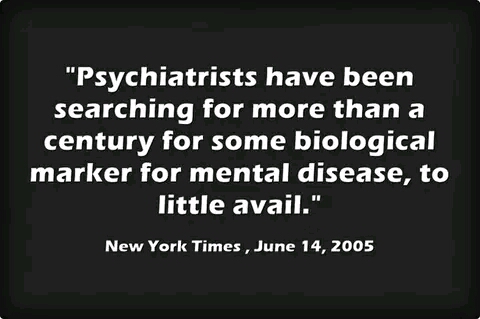
Conclusion: Psychiatry – No Science, No Cures
The video above, published by CCHR International, was downloaded from the linked source. It’s no surprise that psychiatry, with its questionable foundation, found fertile ground in the Maltese courts — just as police frame-ups have. In a corrupt system like Malta’s, my two court cases are far from isolated incidents.
Consider the following examples:
- Emanuel Camilleri was sentenced to prison based solely on the testimony of his daughter — despite evidence that should have cast doubt on her claims (specifically, her virginity, which contradicted her allegations).
- In another case, a letter that could have proved false testimony was ignored, leading to yet another wrongful conviction.
- Nicholas Azzopardi was vilified following his suspicious death; however, this is likely a more accurate portrayal of who he truly was. The same magistrate was assigned to review the case — someone who, under no circumstance, would contradict his earlier report for fear of appearing incompetent. Notably, the CCTV footage showing the exact moment Azzopardi allegedly jumped is conveniently missing. Evidence may have been destroyed to suppress the truth, silencing a man who can no longer defend himself.
Then there are more glaring injustices:
- A father and son were each sentenced to 20 years for the Ħamrun murder, even though it was the son who committed the stabbing. The father was merely present.
- The same judge — Dr. Consuelo-Pilar Scerri Herrera — had, just months earlier, sentenced another individual to 32 years for an attempted murder in which the alleged victim was not even touched and suffered no injury, not even a single scar.
- Yet in another case, involving an actual attempted double murder where both victims were seriously injured, the sentence was only 25 years.
- A Dutch man was sentenced to 30 years, while a Serbian, in a very similar case but with slightly less serious circumstances, was given a life sentence. The key difference? The latter case involved a wealthy businessman.
- Even more disturbing, in another fatal stabbing incident, the same judge, Dr. Scerri Herrera, allowed the perpetrator to walk free.
- This one the most he could have received was a suspended sentence. However, with the backing of the Union, they deliberately delayed his arraignment to allow tensions to subside. Once things had calmed down, corrupt psychiatrists played their part by continuously provoking the patient. They kept him in seclusion for six months, then denied him access to the hospital’s main garden for several more months, let alone granting him leave from the hospital. They also for long deprived him of his smartphone, all of which provocations served as an excuse to further drug and overdose him, ultimately preventing him from ever testifying against.
- This is a case where the courts seem to actively make life harder for some, and easier for others.
Injustices in the Maltese court system are not rare — they are nearly the norm. Who you know, who your enemies are, and how much money you have often determine your fate. As one well-known local lawyer is often quoted as saying: "Għax jien ma niekolx kollox waħdi." ("Because I don’t eat everything alone.")
Abuses by Psychiatrist David Cassar
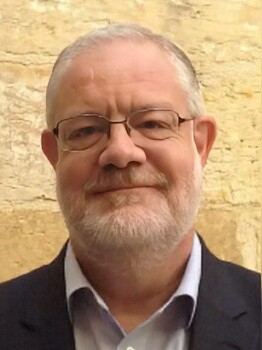 Psychiatrist David Cassar: The most sadistic criminal (1,
2,
3), fraudster, kidnapper, drug-pusher, first-degree murderer, truth suppressor, crime cover-up specialist, obstructor of justice, evidence tamperer, most vicious avenger, perjurer, and pathological liar. In corrupt Malta, this heartless brute is Head of Psychiatry at the University and a court-appointed expert.
Psychiatrist David Cassar: The most sadistic criminal (1,
2,
3), fraudster, kidnapper, drug-pusher, first-degree murderer, truth suppressor, crime cover-up specialist, obstructor of justice, evidence tamperer, most vicious avenger, perjurer, and pathological liar. In corrupt Malta, this heartless brute is Head of Psychiatry at the University and a court-appointed expert.
- In my first court case in 2001, after he saw me for the first time on 18 February 2002, I informed him that false testimony had been given against me in court, including perjury and tampering with evidence, with the malicious intention of causing me to lose bail during the court sitting of 5 July 2001. I also informed him that Magistrate Carol Peralta had threatened to smash me against the wall during the court sitting of 4 February 2002. Despite this, he failed to inform the competent authorities so that these abuses could be investigated and the truth could prevail.
- Instead of supporting me in his role as a psychiatrist and court-appointed expert, he covered up the criminal acts mentioned in point 1 and effectively sided with those who abused me.
- He lied and gave false testimony by portraying me as imagining a conspiracy against me. Specifically, during his testimony on 12 June 2002, he stated that I was suffering from a “psychosis of delusions of persecution.” This claim is contradicted by a letter from the Commission for the Administration of Justice dated 4 October 2004, which shows that something far from normal was occurring. The letter refers to “words which should not have been said, as they were not conducive to the proceedings of the case,” directed at me by a Magistrate “from the tribune” while my case was being heard.
- He abused the free medicines system, causing unnecessary expense to the Government of Malta by prescribing medication (Mon 4/3/02 – 4 Anafranil of 25mg; Mon 25/3/02 – 4 Anafranil of 25mg, 3 Stelazine of 1mg; Mon 22/4/02 – 2 Anafranil of 25mg, 2 Stelazine of 1mg, Sat 22/6/02 – 2 Stelazine of 2mg + 2 Artaine of ½mg, Fri 6/9/02 — 1½ Risperdal of 2mg, Mon 5/5/08 — 1 Risperdal of 2mg, Thu 14/8/14 — Fluanxol (Depixol) Injection / Depot + 2 Artaine of 2mg, [a, b, c], Fri 31/10/14 — Fluanxol (Depixol) Injection + 1 Paroxetine of 10mg + 2 Lexotan of 3mg + 2(?) Artaine of 2mg, 30/4/16 — Risperdal Consta [a, b, c, d, e, f], 17/12/17 — Olanzapine, etc.) that he knew I did not need, in an effort to sedate me, discredit me, and portray me as mentally ill in the eyes of others.
- Using the excuse that I did not want to take pills, he arranged an urgent court sitting on 12-Jun-02 to have me abusively and unjustly locked up in Mount Carmel Hospital, effectively kidnapping me. This happened despite the fact that I had already spent one year on bail, had broken no bail conditions, was working, and posed a danger to no one (except to those who committed the abuses, whom I intended to expose). He could not claim that I was subject to any Treatment Order that forced me to take the medication he prescribed at all costs. His role was solely to prepare a report on me — a report which, after nearly one year, he still had not completed. The indirect intention was to destroy my credibility so that, if I revealed the abuses, I would not be believed. The most important thing for him was to harm me by labeling me as mentally ill and discrediting me above all else, because once a person is labeled as such, no one listens to what they say, all dignity is lost, and everyone views them with suspicion — especially when one is already disadvantaged as an accused person opposing a psychiatrist who is also a court expert.
- On 12-Jun-02, he made improper use of a government facility, namely a hospital, and caused unnecessary expense to the government when he abused his position to have me unjustly confined there for his malicious intentions, despite knowing that I had no illness.
- In the court report related to the first case of 2001, prepared on 21-Jun-02 — and, if I am correct, also mentioned by him during a court sitting — he attributed to me numerous chronic and severe mental illnesses related to paranoia (including schizophrenia, psychosis, delusions of persecution, mental alteration, and paranoid psychosis), all without any scientific basis. He even invented that I was lacking dopamine in my brain, a chemical imbalance or condition that cannot be scientifically tested or verified (for example, through blood or urine samples, CT scans, neuroimaging, or brain scans). This was done to avoid being exposed as lying. In other words, he abused psychiatric terms that are still subject to debate within psychiatry and presented them as established facts before the Court. This shows that he not only lied but also gave false testimony in Court, and that committing perjury against me was nothing unusual for him — suggesting that he may have done the same in other cases without hesitation..
- He took advantage of his position as an expert appointed by the Court, and of the credibility attached to that position, to make false allegations against me (such as claiming that I was imagining a conspiracy, that I lacked dopamine, portraying me as mentally ill, etc.). In doing so, he exploited the fact that his word carried greater authority and was accepted without anyone daring to challenge the contradictions in his statements. He manipulated the case to suit his interests, deceived and misled the Court, avoided criminal proceedings being taken against those who abused me (by covering up their actions), and obstructed the course of justice.
- In the court report of my second case in 2014, dated 2 June 2014, he failed to mention the contradictions and anomalies I had identified in the accusations made by the Police. Although the report appears to acknowledge that I used to find animals dead — thereby confirming that he was aware of the frame-ups and character assassination carried out against me by the Police through unfounded and contradictory accusations, which they knew I had not committed — he took no action and did not alert the Court so that these serious abuses could be investigated. Once again, this constituted a cover-up of serious criminal acts, prevented the truth from prevailing, and obstructed justice against those who abused their positions and were in a position to prevent such criminal acts from occurring.
- Despite being my consultant in the second case of 2014 and knowing that I was on a very small dosage — just one insignificant pill a day — he deceived and misled the Court. He ignored the 12 points I mentioned and fell into my bait, coming to the conclusion that my alleged wrongdoing was the result of my having stopped taking the medication. This was despite the fact that the medication consisted of only a single small pill per day, which was so insignificant that it could not have had any effect on my health. In fact, over time the body becomes accustomed to such medication, making it ineffective, especially when the dosage is already very small and insignificant.
- Because of his false testimony, I suffered a miscarriage of justice in both of my court cases.
- He forced me to take medication despite the fact that in 2014 I had signed a consent formwhich gave me the right to stop medication whenever I wished, as also stated in the Mental Health Act, Article 3.1.i.
- On 4 August 2014, he prescribed me the injection Fluanxol (Depixol), [a, b, c], whose side effects include causing depression and even suicidal tendencies. This shows how irresponsible he was as a psychiatrist, especially after I had already gone through severe trauma, having suddenly lost everything. This followed all the lies published about me in the media, such as being called a “cat killer,” the character assassination I endured, and the frame-ups I suffered at the hands of the police, among others.
- When on 9-Oct-16 I informed him that in fact I had never taken the pills for 12 years from the beginning (and not only during the roughly three years before the second arrest), and that this fact would have turned everything upside down — since he had based the conclusions of the court report in my second court case in 2014 on the assumption that I had stopped taking the medication (a conclusion that was also quoted by all the media) — he did not go before the Court with this new evidence, on which his conclusions had been based. Instead, once again, he prevented the truth from prevailing and obstructed the course of justice. This is because, when he appears in Court (with reference to my cases), he does not tell the truth but lies and misleads the Court.
This shows that he only wanted to mislead the Court when he concluded that my alleged wrongdoing was the result of having stopped taking the medication, because in reality it made no difference to him. He wanted, at all costs, to find an excuse to condemn me once again as mentally ill, and I gave him the bait and he fell for it.
According to the Mental Health Act, Chapter 525, Article 37(a), a report must be drawn up by three psychiatrists, one of whom must be the specialist responsible for me, David Cassar, so that the Court may be in a position either to discharge me from hospital or to continue with the criminal proceedings against me. With the fact I unveiled — that it was not true that I had stopped taking the medication, as they had concluded — this was clearly a case for the second option. David Cassar, as the specialist responsible for me, and even worse, as someone directly involved in the court report of the second case in which he based his conclusions on these false facts, should by far have taken action and was obliged to proceed on this new testimony, which would have overturned everything. It meant that I had been condemned as mentally ill on the basis of false facts and was being kept innocently in a mental institution.
Instead, he refrained from acting and kept me locked up innocently in hospital, and even worse, continued experimenting on me with pills and injections, with all the ugly side effects they caused me. - Not only did he fail to inform the Court, but in order to save his face — so as not to appear that he had intentionally made a wrong diagnosis of me, and that he had lied and had been lying about me since my first court case in 2002, when he began seeing me — he kept me on an injection (Risperdal, [a, b, c, d, e, f]) with severe side effects, possibly permanent to my health (the alternative other injections with other ugly side effects).
This was despite the fact that he now knew, more than ever, that I did not need any medication: not only because my alleged need for medication originated from his pure manipulation of facts in my first court case as an excuse to lock me up for 37 days in hospital back in 2002 to discredit me, but also because I had revealed that the single small pill per day was not something I had stopped taking merely in the three years before the 2014 arrest, but something I had never taken at all for 12 years.
This shows what a man without scruples, conscience, or heart he is, and how far he is willing to go — to the point of being ready to ruin the health and destiny of a man capriciously — simply to save his face. - After I reported two of his abuses to the Commissioner of Mental Health (between October and December 2016) and to the Chairman of Psychiatry, he declared that I had “deteriorated” and, in retaliation, cut off all contact with me for more than a year (from 20 October 2016 until 5 December 2017). If I had truly deteriorated, one would have reasonably expected increased medical follow-up and supervision, not total abandonment. Once again, he contradicted himself. For him, “deteriorated” clearly meant that I was still not sedated enough, not mentally destroyed, and not sufficiently disabled by the injections and pills, as he intended me to be.
- He subjected me to one form of mental torture after another: first the injection Fluanxol (Depixol), [a, b, c], which causes extreme restlessness, depression, and suicidal thoughts; then the injection Risperdal, [a, b, c, d, e, f], which deprived me of sleep and caused impotence, leg pain (early signs of Parkinson’s disease, with a risk of more than 1 in 10), depression (also risk of more than 1 in 10), and possibly diabetes (risk of 1 in 100). He later prescribed Olanzapine pills, which made me drowsy, caused delirium, left me suffering from impotence, and cannot possibly increased my blood pressure, among other serious effects. Had he succeeded in imposing Olanzapine in injection form instead of the pill, every time I received it I would have been forced to remain under prolonged blood-pressure observation for three hours and then spend the remainder of the day completely bedridden.
- He embezzled Government funds by prescribing medication he knew I did not need — pills since 2002 and injections since 2014 — thereby charging unnecessary costs to the Government and, ultimately, to the taxpayer. He persisted in this abuse even after I handed him a letter dated 9 October 2016, in which I informed him that the court report in the second case was based on incorrect facts, since in reality I had not taken the pills for 12 years. This was despite the fact that I had also informed him that I possessed proof to substantiate this claim, including pills dating back to the early years.
- He lied and gave false testimony when he said that I am schizophrenic, when in fact, if there is an illness that is incompatible with me, it is this one. I was a healthy individual who, over a period of fifteen and a half years, worked without taking a single day of sick leave (except for the 37 days he locked me up in 2002). I used to cycle from my home in Mosta to work in Delimara and back nearly every day (something some people find difficult even by car). I managed to make no fewer than twelve keys (which is by no means easy and requires belief and confidence in oneself). I also managed to enter the crypt of Mosta Church in the middle of the night (something some people find difficult even in broad daylight).
All this shows how I could never have been schizophrenic, as schizophrenic persons see visions, hear voices, and are afraid of them — symptoms I never had, nor any others. Moreover, by succeeding in not going crazy during all the years I was locked in hospital after all the injustices, abuses, vindictiveness, breaches of human rights, and lies told about me — not to mention the mental torture I have been subjected to because of the side effects of the injections and pills — it is clear that I was not ill before the arrest, when I had everything. - He lied blatantly in the Court report of my second court case, among other things, when he stated that I had been mentally ill since childhood and had been locked up for several years in Mount Carmel Hospital.
- For all these years I was held hostage and threatened, with a millstone around my neck, that if I reported the abuses I suffered — including his — he would again claim that I was imagining a conspiracy against me, interpret it as me not taking the pills, and use it as an excuse to lock me up again in Mount Carmel Hospital, as he abusively did in 2002.
When he locked me up in 2002, it was really a show of force — an act of bullying. He wanted to teach me how far he could go, that no one could stand up to him, that the small fish never eats the big one, that he could trample on you whenever and however he wanted, and manipulate the case as he wished without anyone daring to question the great contradictions in what he said.
Being labeled as “mentally ill” was the first step toward further abuses. He wanted to show me that, just as he locked me up in 2002, he could do the same whenever he wanted — this time even more easily — because now I was labeled as mentally ill and thus stripped of dignity, with no one paying attention to what I said. For this reason, in my second court case in 2014, I had to tell them that the arrest happened because I had stopped taking the medication during the roughly three years before it, instead of telling them that I had never taken his pills for twelve years. Otherwise, I risked being locked up again — this time for the rest of my life — and being prescribed injections, which he in fact did.
I already had experience with him in 2002 and had learned well what a tyrant without conscience or scruples he is, and how far he is willing to go. - He tried to destroy me mentally destroyed and make my life a living hell when I was at my most vulnerable. In the first case, in 2001, false testimony/perjury and tampering of evidence occurred, as was revealed in the court sitting of 5‑Jul‑01. A video that had taken place before the arrest was manipulated to make it appear as if it had occurred afterward, with the malicious intention of causing me to lose bail. Later, during the court sitting of 4‑Feb‑02, Magistrate Carol Peralta threatened to smash me against the wall. My lawyers then refrained from mentioning these abuses or defending me. All these abuses could easily have destroyed me mentally. Subsequently, during a court sitting on 12‑Jun‑02, he arranged to have me locked up in Mount Carmel Hospital under the pretext that I refused to take the pills he prescribed. He then twisted the situation and invented a diagnosis, claiming I was suffering from “psychosis with delusions of persecution,” labeling me as mentally ill so that I would not be considered credible if I dared to reveal these abuses.
In the second case, in 2014, despite being fully aware that unfounded accusations, frame‑ups, and character assassination had been made against me, and despite the trauma, lies spread about me in the media, the injustices I suffered, and the breaches of my human rights — abuses that could once again have easily destroyed me mentally — he prescribed injections known to cause severe depression, including one that can drive a person to suicide. These drugs had side effects that left me disabled, suffering from impotence, and, in the case of Risperdal, unable to sleep, among other effects, with the intention of destroying me mentally and ruining my health. - He defamed me by labeling me as mentally ill, together with all the prejudice and stigma that this carries, simply to render me not credible if I dared to expose the abuses I suffered in my first court case, while simultaneously covering up those who committed crimes. In the second case of 2014, he deliberately and maliciously continued to build upon this incorrect diagnosis, which had begun more than twelve years earlier. It is a profound humiliation to be labeled mentally ill when you are not, and even more frightening to be forced to take medicines, pills, or injections you do not need, which are damaging your health through their severe side effects.
- He gave false testimony in court (perjury) in the two cases involving me. This is particularly serious because he acted in his role as a court-appointed expert. On the basis of his testimony, the Magistrate had to sentence me. He portrayed me as severely mentally ill, attributing to me every type of paranoia he could invent: from paranoid psychosis to schizophrenia, from delusions of persecution to general mental impairment. He even depicted me as disabled due to an alleged lack of dopamine in my brain, and similar claims. All of this was based purely on hearsay, without the slightest scientific evidence, such as blood or urine tests, CT scans, or neuroimaging (brain scans).
Despite the many illnesses he claimed I was suffering from, he went as far as arranging a court sitting on 12-Jun-2002 to have me forcibly hospitalized for 37 days, insisting that I urgently needed psychiatric medication and that without it I was “nothing,” a completely mentally ill person. In reality, I never took a single day of sick leave during more than 15 and a half years of employment, up to my second arrest in 2014, except for the period when he had me hospitalized in 2002. This was despite the fact that I never took the pills he prescribed for the supposedly chronic and severe mental illnesses he claimed I had. - He began harming and disabling me gradually. First, he administered the injection Fluanxol, [a, b, c], which caused severe depression to the point of inducing suicidal thoughts. He then administered another injection, Risperdal, [a, b, c, d, e, f], which not only caused depression but also led to symptoms consistent with Parkinson’s disease, among other conditions. Later, he prescribed Olanzapine, which causes drowsiness, delirium, increased blood pressure, and left me suffering from impotence, among other side effects. Furthermore, on 5-Apr-2018, he doubled my dosage of Olanzapine from 5 mg daily to 10 mg daily, with the intention of covering up another abuse, continuing to discredit me by making it appear as though the abuse was merely a product of my imagination, and to further harm me mentally by sedating me.
- When the Minister of Justice approved some leave per week for me on 16-Sep-17, Dr Cassar did not proceed with it. It took four months for him to approve that I could go out for a few hours per week, and over six months for him to approve the five hours twice per week that the Minister had originally approved. For several months, he vindictively kept me effectively kidnapped in hospital. If I had not written again to the Medical Council on 15-Jan-18, he would probably have approved nothing at all. This was not because I was smashing things or behaving in a dangerous or irrational manner, but simply to intimidate me for having reported the severe abuses I had suffered from him over the years. Furthermore, on 28-Mar-18, a doctor appearing on his behalf told me that he was not going to write to the Minister to increase my leave, which showed how cruel and conscienceless he was. This was after I had already spent years locked up in hospital, and it appeared that he wanted to continue depriving me of the possibility of going out indefinitely, preventing me from working, earning a living, enjoying liberty, and living my life. In the letter approving my leave, the Minister had stated that it should be revised after three months, yet Dr Cassar delayed writing again until August 2018. As if this were not enough, he also kept me unjustly confined despite the fact that, in a letter dated 9-Oct-16, I had informed him that I had not taken the pills for 12 years. This fact would have overturned everything, as it meant that the court report was based on incorrect conclusions that I had stopped taking medication only in the roughly three years preceding my second arrest in 2014, when this was far from true.
- In June 2020, he covered up abuses by staff members when I reported them to Customer Care and the CEO Stephanie Xuereb, by locking me in Male Ward 1 and then in Male Ward 7 in order to silence me abusively.
- He imposed restrictions on my freedom of communication on two occasions (1, 2) in order to destroy me mentally and prevent me from reporting his abuses and those of others against me.
- He increased my dosage of Olanzapine by another 50% based on a blatant lie that I wanted to stab him. If this had truly been the case, the police would have been called to interrogate me.
- He denied me the right to replace him as my consultant with another psychiatrist (1 , 2), so that he could continue abusing me at his leisure and further torture me psychologically. To replace him, I had to write to the Ombudsman (1, 2).
- He was probably involved, together with friends he has in court, in the theft of my 2014 court case from the court archives, because it contained his report based on incorrect conclusions, which exposed him as a fraudster and incompetent.
- Similarly, he was involved in the theft of my Mount Carmel Hospital file around the end of October 2019, which contained many records of the abuses I had suffered from him. I had managed to photograph it a few days earlier and upload parts of it to a webpage. After this, a new hospital file was started. To avoid a repetition of the same situation, around June 2021 I asked Psychiatrist Catherine Dimech and the Ombudsman, as outlined in these emails, to allow me to photograph parts of the new file containing further abuses against me (including points 27–30 above), together with incident reports. This request appeared to serve as a warning for them to once again eliminate this evidence before it could ever reach my hands.
